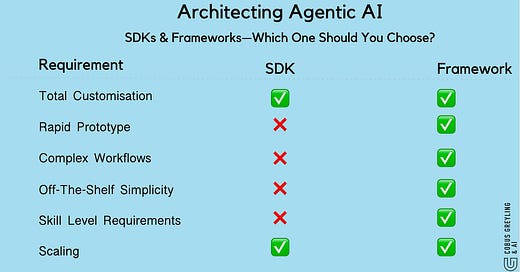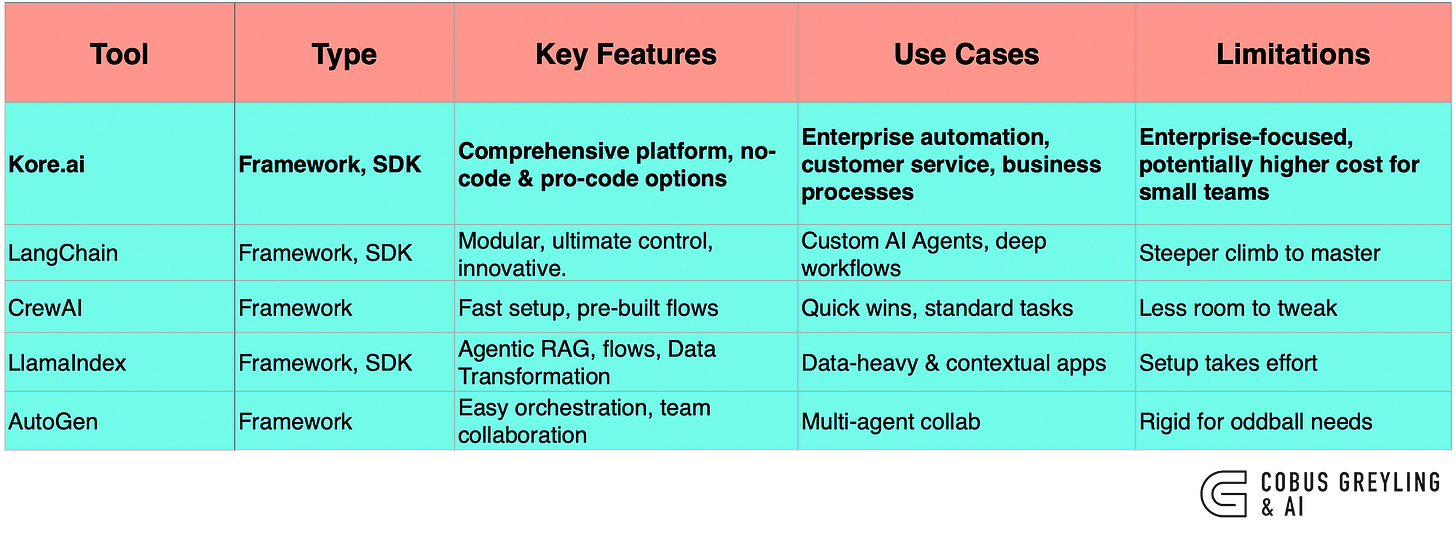Architecting Agentic AI — SDKs vs. Frameworks — Which One Should You Choose?
Enterprise AI — Decision-Making Paralysis in a Rapidly Evolving Landscape
One thing I’ve come to realise is that many enterprises are hesitant to make decisions around AI.
This hesitation often stems from past missteps and a broader struggle to keep pace with the constantly evolving tools, terminology and technological landscape.
The rapid development of AI has created a sense of uncertainty, making it difficult for organisations to commit to a clear direction.
In a previous post I did a deep dive into Agentic AI, I explored how SDKs, Scaffolding & Frameworks shape the future of intelligent AI Agents.
In this post I want to double-click on that idea, and look at real-world wins and a trend that’s shaking up the AI Agent dev scene.
Frameworks, SDKs & Hybrid Approaches
A Software Development Kit (SDK) is a collection of tools, libraries, APIs and documentation designed to help developers create applications for a specific platform or technology, like the iOS SDK for Apple apps.
It streamlines development by providing ready-to-use components and utilities.
A Framework is a reusable, structured set of code libraries and guidelines that provides a foundation for building applications.
It defines the app’s architecture and enforces conventions.
Frameworks often consist of a no-code to low code abstraction layer, consisting of a GUI with development primitives.

Key Differences
Scope
SDKs are broader, often encompassing frameworks, APIs, and tools.
Frameworks are narrower, focusing on providing a specific structure for app development.
Purpose
SDKs simplify development for a platform.
Frameworks guide the design and flow of an application.
Flexibility
Frameworks often impose a specific architecture.
While SDKs offer tools with more flexibility.
Hybrid Approach
Some technology providers blend SDKs and frameworks to offer comprehensive solutions.
For example, some technology providers have an SDK with tools and APIs for backend services, while including frameworks like for front-end development UIs.
This hybrid model combines the flexibility of SDKs with the structured guidance of frameworks, enabling developers to build scalable, well-architected apps efficiently.
Yet, as AI Development evolves, some platforms stand out by merging these strengths — combining the adaptability of an SDK with the ease of a framework, especially for tackling complex, enterprise-level challenges.
Real-World Wins
Picture a healthcare startup determined to transform patient triage….
They chose a modular SDK to build an AI agent capable of analysing symptoms, medical histories and real-time data with precision.
This approach allowed them to integrate specialised medical databases and tweak the AI Agent to their exact specifications — demonstrating the strength of tailored customisation.
Now, consider a financial firm under tight deadlines to tackle fraud.
They adopted a framework designed for rapid deployment, using pre-built workflows to launch a multi-agent system almost instantly.
This swift rollout helped them meet critical deadlines and navigate regulatory pressures, underscoring the value of efficiency and structure.
The key difference?
SDKs works well when crafting basic initial bespoke solutions, while frameworks deliver speed and simplicity.
Assess Your Project Needs
Specific Platform Development
If your organisation is building for a particular platform (for example iOS, Android, or a cloud service like AWS), start with an SDK.
SDKs provide platform-specific tools, APIs, and documentation to streamline development. For example, use the Android SDK for Android apps.
Structured Application Development
If you need a consistent architecture for your application (for example web, chatbot or mobile UI), begin with a Framework.
Frameworks enforce conventions, making development faster and more maintainable.
End-to-End Solution
If your project requires both platform-specific tools and a structured approach (for example a mobile app with cloud integration), consider a hybrid approach.
Evaluate Team Expertise
Experienced Team
If your developers are skilled in specific technologies, choose a framework or SDK that aligns with their expertise.
For instance, a team familiar with JavaScript might prefer Node.js (framework) or the AWS SDK for JavaScript.
No-code primitives and building blocks empower users by providing intuitive, pre-built components that streamline application development without requiring traditional coding expertise.
Modular tools (no-code primitives) merge design and development, enabling rapid prototyping and deployment while democratising access to AI Agent creation for non-technical users.
Some fear that proprietary no-code platforms risk work being lost due to vendor lock-in, but this concern overlooks a parallel in traditional coding: pro-code development is often tightly coupled to specific SDKs or frameworks, like React or the Android SDK, which can also create dependencies and compatibility challenges.
No-code frameworks mitigate this by abstracting complexity, offering maintenance updates and seamless integrations that keep apps functional across evolving tech landscapes.
By prioritising accessibility and efficiency, no-code solutions not only rival the flexibility of coded systems but also foster inclusive innovation, allowing diverse teams to contribute to digital transformation without sacrificing scalability or stability.
Mixed or Novice Team
A hybrid approach can be beneficial, as it provides flexibility (via SDK tools) and structure (via frameworks), reducing the learning curve.
Consider Scalability & Maintenance
SDKs
Best for projects needing flexibility or integration with multiple platforms.
However, they may require more effort to define architecture.
Frameworks
Ideal for long-term projects where maintainability and scalability are priorities, as they enforce standards. Be cautious of framework lock-in, which can limit flexibility.
Hybrid
Offers a balance, allowing rapid prototyping with SDK tools and scalable architecture via frameworks.
Start Small & Iterate
Begin with an SDK if your project is platform-specific or experimental, as it provides tools without rigid constraints. For example, use the Stripe SDK for payment integration.
If your project demands a clear structure or is part of a larger system, start with a Framework to ensure consistency.
For complex projects, explore a hybrid provider like Kore.ai, Google or Microsoft, which offer SDKs and frameworks that integrate seamlessly.
Chief Evangelist @ Kore.ai | I’m passionate about exploring the intersection of AI and language. From Language Models, AI Agents to Agentic Applications, Development Frameworks & Data-Centric Productivity Tools, I share insights and ideas on how these technologies are shaping the future.






